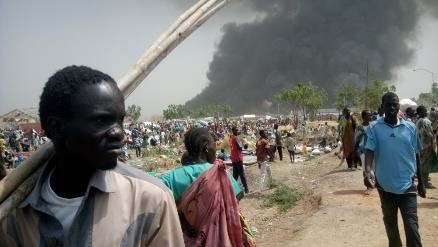The United Nations Mission in South Sudan failed to protect civilians and intentionally blocked residents from reaching safety during an attack on the Malakal PoC base, Doctors Without Borders (MSF) said in an investigation released yesterday.
On February 17th, men wearing SPLA uniforms entered the PoC and began to burn shelters based on tribal affiliation. Roughly 40 people died in the attack, and 20,000 people were displaced.
“By not ensuring that adequate preventive measures were taken, failing to act to stop the violence in a timely manner and actively blocking the IDPs from reaching safety during a large part of the emergency, UNMISS effectively failed to protect the civilians it is mandated by the UN Security Council to protect” the MSF investigation said.
The health provider described a harrowing scene where civilians attempted to flee the fighting, only to be trapped inside the PoC by a locked gate.
“On several occasions, MSF urged the UNMISS soldier guarding the gate to open it, although he asserted that he did not have the green light to do so” MSF said. “When the fighting got closer, this panic grew and hundreds of people jumped over the fence and started streaming into the MSF compound”
One MSF staff member was killed during the ensuing crowd crush near the gate. The organization also highlighted challenges current civilians living in the PoC face. 91% of male, and 79% of female respondents said they do not feel safe in the PoC, an MSF survey found. Sexual violence appears to be high as well.
“Incidence of sexual violence was high with over half of all respondents (57 per cent) saying they or someone they directly know has suffered sexual violence” MSF said.
Moon makes statement on UN investigations
In a note to correspondents yesterday, UN Secretary General Ban Ki-moon said that a UN report found the Malakal attacks were spurred by “deep rooted historical land disputes, the ‘28 States’ Order and the Eastern Nile State Administrative order of 1 February which dismissed all Shilluk and Nuer civil servants”
The Secretary General also identified reported failures of UNMISS during the Malakal attack.
“There was confusion with respect to command and control and Rules of Engagement and a lack of coordination among the various civilian and uniformed peacekeepers in Malakal at the time of the crisis,” he said.
Related
Malakal attack: What UN knew vs what it said (11. May)
UNMISS to be investigated over Malakal breach (11. Mar)




